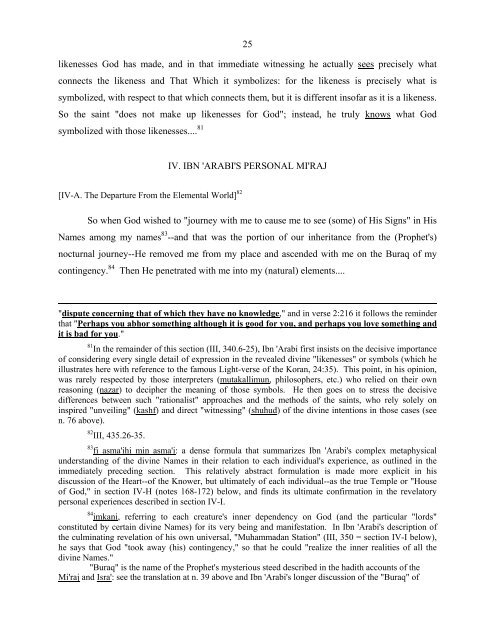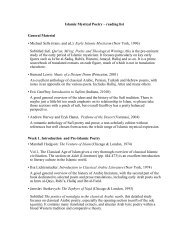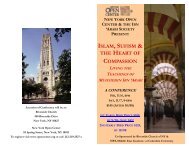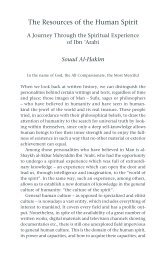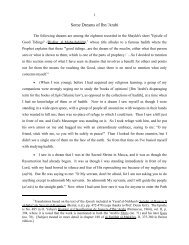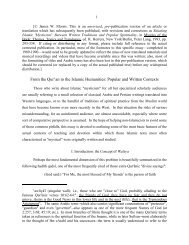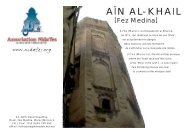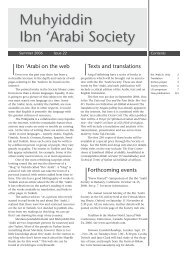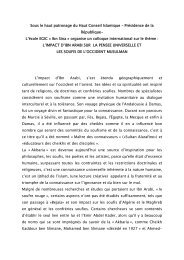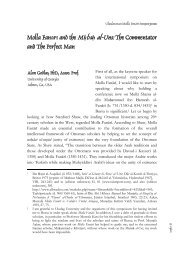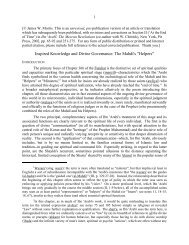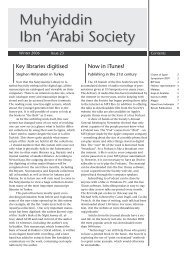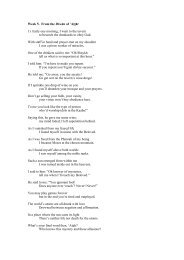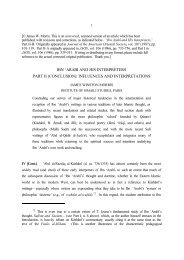24him by way of inner unveiling <strong>and</strong> immediate witnessing, direct experience <strong>and</strong> ecstatic"finding." 76Thus ordinary people (when <strong>the</strong>y object to those who speak of this spiritual voyage) aredenying precisely That within Which <strong>the</strong>y are <strong>and</strong> through Which <strong>the</strong>y subsist. So if (<strong>the</strong>traveler) did not mention <strong>the</strong> way in which he obtained <strong>the</strong> inner knowledge of <strong>the</strong>se things, noone would deny or dispute him. For all of <strong>the</strong> (ordinary) people--<strong>and</strong> I do not exclude a singleone of <strong>the</strong>m--are "making up likenesses for God"; 77 <strong>the</strong>y have always agreed <strong>and</strong> cooperated inthat, so not one of <strong>the</strong>m criticizes ano<strong>the</strong>r for doing it. God says: "Do not make up likenessesfor God..." (Kor. 16:74)--yet <strong>the</strong>y remain blind to that Sign. 78But as for <strong>the</strong> friends of God (Kor. 10:64-66), 79 <strong>the</strong>y do not make up likenesses for God.For God is <strong>the</strong> One Who makes up likenesses for <strong>the</strong> people (Kor. 14:25; 24:35), because of Hisknowledge of <strong>the</strong> underlying intentions (of those symbols), since God knows, but we do notknow 80 (see Kor. 16:74; 3:66; 2:216). Thus <strong>the</strong> saint (<strong>the</strong> one truly "close to God") observes <strong>the</strong>76 kashfan shuhudan dhawqan wujudan: see <strong>the</strong> extensive references to <strong>Ibn</strong> '<strong>Arabi</strong>'s usage of eachof <strong>the</strong>se key terms in Hakim, Mu'jam, pp. 971-972 (kashf), 654-667 (shuhud <strong>and</strong> related forms), <strong>and</strong> 492-495 (dhawq), as well as his discussions concerning <strong>the</strong> necessary role of this "direct experience" (dhawq)in his encounters with Joseph <strong>and</strong> Moses in section IV (notes 108 <strong>and</strong> 145) below.77 I.e., instead of grasping <strong>the</strong> inner reality of God's symbols, those that already exist (<strong>and</strong> whichultimately constitute all reality). "(Ordinary) people" here translates al-nass, a Koranic expression withmuch <strong>the</strong> same meaning here as al-'alam (n. 73) in <strong>the</strong> preceding sentences--i.e., everyone but <strong>the</strong>accomplished saints, <strong>the</strong> "Friends of God" discussed in <strong>the</strong> following paragraph.The phrase in quotation marks here (<strong>and</strong> in <strong>the</strong> various Koranic verses discussed below) couldalso be translated as "making up likenesses (or symbols) of God"--<strong>and</strong> that activity certainly accounts foran important part of <strong>Ibn</strong> '<strong>Arabi</strong>'s criticism. However, it gradually emerges from <strong>the</strong> subsequent discussionthat <strong>the</strong> main focus of his critique here is man's natural (<strong>and</strong> more universal) tendency not to grasp <strong>and</strong>assimilate <strong>the</strong> "likenesses" (or "symbols," amthal) contained in <strong>the</strong> divine revelation (in all its infiniteforms <strong>and</strong> "Signs"), but ra<strong>the</strong>r to impose his own limiting conceptions <strong>and</strong> st<strong>and</strong>ards on God <strong>and</strong> <strong>the</strong>world.78 Or "to (<strong>the</strong> meaning of) that verse": <strong>the</strong> individual verses of <strong>the</strong> Koran are traditionally referredto as <strong>the</strong> divine "Signs" (ayat) par excellence.79 or "those close to God," awliya' Allah: <strong>the</strong> term wali (pl. awliya) has usually been translatedhere as "saint," but in this case <strong>Ibn</strong> '<strong>Arabi</strong> is more clearly stressing <strong>the</strong> root sense of <strong>the</strong>ir special closenessor proximity to God--a meaning which is also brought out in <strong>the</strong> Koranic verses concerning <strong>the</strong>se rareindividuals "who have no fear <strong>and</strong> are not sad," who have reached "<strong>the</strong> ultimate Achievement" (alfawzal-'azim). (See also <strong>the</strong> more comprehensive discussion in Chodkiewicz, Sceau, chapters I <strong>and</strong> III.)80 Although <strong>the</strong> phrase ."..God knows, but you do not know" completes <strong>the</strong> Koranic verse(16:74) already quoted in <strong>the</strong> preceding paragraph, its more illuminating use in <strong>the</strong> o<strong>the</strong>r two versesevidently forms <strong>the</strong> background for this particular allusion: in Kor. 3:66 it is applied to those who
25likenesses God has made, <strong>and</strong> in that immediate witnessing he actually sees precisely whatconnects <strong>the</strong> likeness <strong>and</strong> That Which it symbolizes: for <strong>the</strong> likeness is precisely what issymbolized, with respect to that which connects <strong>the</strong>m, but it is different insofar as it is a likeness.So <strong>the</strong> saint "does not make up likenesses for God"; instead, he truly knows what Godsymbolized with those likenesses.... 81IV. IBN 'ARABI'S PERSONAL MI'RAJ[IV-A. The Departure From <strong>the</strong> Elemental World] 82So when God wished to "journey with me to cause me to see (some) of His Signs" in HisNames among my names 83 --<strong>and</strong> that was <strong>the</strong> portion of our inheritance from <strong>the</strong> (Prophet's)nocturnal journey--He removed me from my place <strong>and</strong> ascended with me on <strong>the</strong> Buraq of mycontingency. 84 Then He penetrated with me into my (natural) elements...."dispute concerning that of which <strong>the</strong>y have no knowledge," <strong>and</strong> in verse 2:216 it follows <strong>the</strong> reminderthat "Perhaps you abhor something although it is good for you, <strong>and</strong> perhaps you love something <strong>and</strong>it is bad for you."81 In <strong>the</strong> remainder of this section (III, 340.6-25), <strong>Ibn</strong> '<strong>Arabi</strong> first insists on <strong>the</strong> decisive importanceof considering every single detail of expression in <strong>the</strong> revealed divine "likenesses" or symbols (which heillustrates here with reference to <strong>the</strong> famous Light-verse of <strong>the</strong> Koran, 24:35). This point, in his opinion,was rarely respected by those interpreters (mutakallimun, philosophers, etc.) who relied on <strong>the</strong>ir ownreasoning (nazar) to decipher <strong>the</strong> meaning of those symbols. He <strong>the</strong>n goes on to stress <strong>the</strong> decisivedifferences between such "rationalist" approaches <strong>and</strong> <strong>the</strong> methods of <strong>the</strong> saints, who rely solely oninspired "unveiling" (kashf) <strong>and</strong> direct "witnessing" (shuhud) of <strong>the</strong> divine intentions in those cases (seen. 76 above).82 III, 435.26-35.83 fi asma'ihi min asma'i: a dense formula that summarizes <strong>Ibn</strong> '<strong>Arabi</strong>'s complex metaphysicalunderst<strong>and</strong>ing of <strong>the</strong> divine Names in <strong>the</strong>ir relation to each individual's experience, as outlined in <strong>the</strong>immediately preceding section. This relatively abstract formulation is made more explicit in hisdiscussion of <strong>the</strong> Heart--of <strong>the</strong> Knower, but ultimately of each individual--as <strong>the</strong> true Temple or "Houseof God," in section IV-H (notes 168-172) below, <strong>and</strong> finds its ultimate confirmation in <strong>the</strong> revelatorypersonal experiences described in section IV-I.84 imkani, referring to each creature's inner dependency on God (<strong>and</strong> <strong>the</strong> particular "lords"constituted by certain divine Names) for its very being <strong>and</strong> manifestation. In <strong>Ibn</strong> '<strong>Arabi</strong>'s description of<strong>the</strong> culminating revelation of his own universal, "Muhammadan Station" (III, 350 = section IV-I below),he says that God "took away (his) contingency," so that he could "realize <strong>the</strong> inner realities of all <strong>the</strong>divine Names.""Buraq" is <strong>the</strong> name of <strong>the</strong> Prophet's mysterious steed described in <strong>the</strong> hadith accounts of <strong>the</strong>Mi'raj <strong>and</strong> Isra': see <strong>the</strong> translation at n. 39 above <strong>and</strong> <strong>Ibn</strong> '<strong>Arabi</strong>'s longer discussion of <strong>the</strong> "Buraq" of


